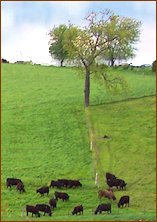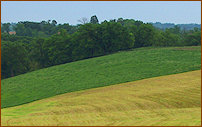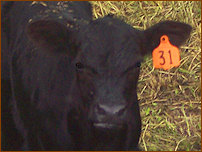Why Eat Grass-Fed Beef?
Not so many years ago, a majority of the beef in the United States was produced and finished by using grass exclusively. In fact, it wasn't until the 1950's that large feed lots and grain-fed techniques became widely popular. The grain-fed movement spread very quickly and by the 1980's, large feed lots were responsible for producing nearly 100% of this country's beef.
The nation's switch to grain had a strong rationale. Grain-fed techniques have neutralized many of the unpredictable variables associated with raising cattle (favorable weather, green grass, and steady pricing in the market) and significantly streamlined the nation's beef supply chain. However, several nutritional experts now believe that this migration to grain-fed beef was not in the best interest of our nation's long-term health. For instance, rates of heart disease and obesity in the U.S. have increased significantly during the last four decades. Many researchers believe that the timing of these two events is more than just a mere coincidence.
While still a niche movement, grass-fed beef production and consumption is making a comeback. To better understand why, consider the following comparisons of grass-fed versus grain-fed beef:
Grass-Fed vs Grain-Fed Beef
 Grass-Fed Beef
Grass-Fed Beef
- Low saturated fat levels (similar to the levels found in lean chicken breasts)
- High in "good fat" omega-3's (also commonly found in certain fish, such as salmon and tuna)
- High doses of conjugated linoleic acid (CLA), thought by many to be a cancer fighter
- Reduced exposure to E.coli bacteria
- Features an agriculture process that is ecologically friendly
Grain-Fed Beef
- Saturated fat levels are often up to 3-4 times higher than those found in grass-fed beef
- Limited Omega-3 content
- Limited CLA content (because CLA comes directly from the grass)
- E.coli risks remain a constant and growing concern
- Production system requires significant use of chemicals, fertilizers and gasoline
How We're Different
One of the biggest complaints about grass-fed beef is that the taste, quality and consistency are often inferior to grain-fed products. At Mountain Lane Farm, we challenge people to purchase just one pound of ground beef from us. Just try one pound and if you believe its inferior, then let us know. We have the philosophy that we must always improve and never grow complacent. Your input is not only appreciated, its necessary for us to continue our mission. However, just try a pound and tell us what you think!
 At a minimum, you should find Mountain Lane Farm's meat to be the best-tasting, most consistent grass-fed beef available anywhere. People who have sampled Mountain Lane Farm beef say that it tastes as good or better than anything else they've eaten. "It tastes like meat!" is often the call we hear back from our returning and new customers.
At a minimum, you should find Mountain Lane Farm's meat to be the best-tasting, most consistent grass-fed beef available anywhere. People who have sampled Mountain Lane Farm beef say that it tastes as good or better than anything else they've eaten. "It tastes like meat!" is often the call we hear back from our returning and new customers.
Mountahttps:// Farm cattle are currently raised on lush grasslands of the Driftless Region by farmers who adhere to the highest standards in the industry. As a member of Animal Welfare Approved, Mountain Lane Farm are audited every year to ensure that each animal is free from antibiotics, growth hormones and that the land is free from herbicides and pesticides. The protocols we must follow are directly in line with federal organic standards and in some cases are even more stringent than organic standards.
Our cattle eat nothing but grass (and hay in winter) a little mineral and water. Our cattle eat what Mother Nature designed their bodies to digest: grass - nothing more and nothing less.
Start with the Soil
Our premium beef begins with the soil. It is the foundation upon which our system is built. We constantly monitor soil fertility, measuring and adjusting levels as necessary. We implement processes by Gary Zimmer and Midwest Bio-Ag as well as adhere to the philosophies of Dr. William A. Albrecht, Joel Salatin, Wendell Berry and other tremendous minds who speak to the correlations between soil health and human health.
The Best Grass
Mountain Lane Farm also grow and manage the finest blends of alfalfas, grasses and brassicas in the industry. Grass is the backbone of Mountain Lane Farm. Having a "salad bar" approach (planting and replanting a wide array of plants) allows our cattle to select the most nutritiously appealing foodstuffs which maintains health, promotes accelerated calf growth as well as strong finishing potential for rendering candidates.
Select Animals and Premium Care
 At Mountain Lane Farm, our animals are constantly monitored for growth. We hold high standards for the calf care by our mothers. Those cows that don't adhere to these standards are removed and are replaced internally. While breeding protocols to synchronize animals is appealing, we elect to use natural animal service of 1st calf heifers to sires that allow for calving ease in order for these new mothers to birth and then care for their new calf on their own. For cows, we have four registered bulls, with three waiting in the wings who have lowline genetic lines that produce small calves who have the potential to grow well on grass.
At Mountain Lane Farm, our animals are constantly monitored for growth. We hold high standards for the calf care by our mothers. Those cows that don't adhere to these standards are removed and are replaced internally. While breeding protocols to synchronize animals is appealing, we elect to use natural animal service of 1st calf heifers to sires that allow for calving ease in order for these new mothers to birth and then care for their new calf on their own. For cows, we have four registered bulls, with three waiting in the wings who have lowline genetic lines that produce small calves who have the potential to grow well on grass.
As far as health, that is rarely a concern. Our husbandry practices ensure that the animals are treated as humanely as possible. That doesn't mean coddling, but it does mean treating our animals with the respect they deserve.
Customized Processing
Premier Meats, Inc., Viroqua allows Mountain Lane Farm a flexibility in preparing the animal the way you would like. Please contact us about how we can work with you to have Mountain Lane Farm meat in your home.
Experienced People
Mountain Lane Farm is inspired and led by experienced professionals in the grass and cattle industries. We are life long farmers who welcome each day as an opportunity to learn about a new grass, greet a new calf to the herd or meet a new customer.
